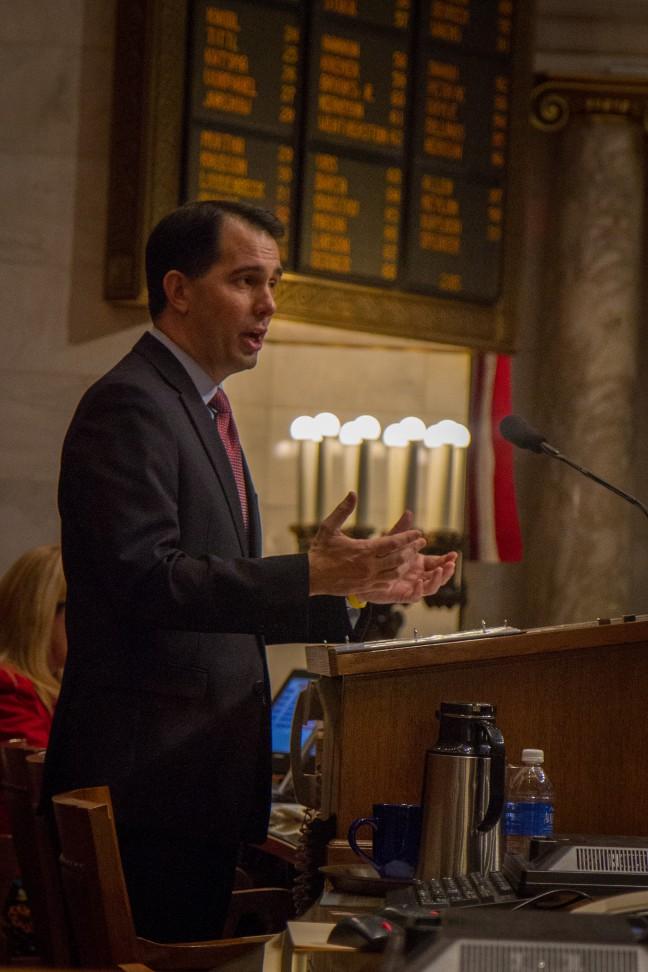You’ve heard that Gov. Scott Walker is proposing new legislation that would change a lot of things regarding the UW System. Coupled with those changes is the fact that the UW System will see $150 million less per year over the next two years.
If you’ve listened to the conversations regarding this topic on campus, you’ve probably concluded something like: “Walker hates public education. He hates the UW System, is cutting a huge amount of money and others after me are going to suffer because of this.”
Yes, there will be a cut coming to the UW System. No, the UW System is not royally screwed because of this. You see, along with the cuts comes something the UW System has long been lobbying for: more freedom and autonomy as a system.
This idea isn’t something new, either. In 2005, Virginia passed the Restructuring Act. This bill, similar to what Walker is proposing, granted more autonomy to the state system as long as the state system met certain statutory educational goals and requirements laid out by the legislature.
Like Walker’s proposal, the passage of the bill was also coupled with cuts to their state system. In fact, the Virginia state system faced a 27 percent cut. The UW System is facing a lower one at 13 percent. The legislation in Virginia is still actively being used and improved upon. We’ve seen something like this succeed in another state with similar circumstances, but what about our state?
When Act 10 was first proposed, opponents were outraged that the governor cut a significant amount of state aid to public schools. However, Walker and other Republican legislators knew that granting local school boards more control would allow them to save more money in the long run and would give them more flexibility of administrative decisions.
Are Democrats still harping on Act 10? Did Mary Burke run against Act 10? No. Why? Because it’s working! Wisconsin students have the second-highest ACT scores in the country, more students are graduating and third grade reading scores are up. I don’t have time to tell you about all of the success stories, but those are some of the highlights mentioned in Walker’s budget address.
Through the Virginia example, we’ve seen something like this work in another state at the same level, and we’ve seen fundamental changes like this work in our state at a more local level through Act 10. That is why I believe it will work at the university level. This is not saying that this legislation should pass as is. Of course there are issues that need to be resolved.
This was just the start of the dialogue. In fact, some concerns have already been addressed. Last week, Sen. Steve Nass, R-Whitewater, proposed two changes to address some issues with the proposal.
The first would reduce the term limit of the members of the Board of Regents from seven to three years. These positions are appointed by the governor and approved by the Senate. The shorter terms would thus equal greater accountability. The second amendment to the proposal would cap the amount the Board of Regents could raise tuition relative to the Consumer Price Index (CPI).
In sum, there will be a decrease in the UW System’s funding. Along with those cuts will come more system autonomy. This autonomy will allow for the system to make up the loss of those funds and then some.
It won’t be easy at first, because we haven’t done this before. It will foster creativity, resourcefulness and efficiency that will, in the end, lead to greater success for the UW System.
The dialogue has just begun. What you hear now will not be what actually passes.
I challenge you to sift through the rhetoric and buzzwords and look at the details. At the entrance to Bascom Hall there is a plaque with a quote from the 1894 Board of Regents. It says, “Whatever may be the limitations which trammel inquiry elsewhere, we believe that the Great State University of Wisconsin should ever encourage that continual and fearless sifting and winnowing by which alone the truth can be found.”
Sift. Winnow. It will be a challenge and take a lot of hard work. But if we put in the time and effort, it will lead to a better, stronger future.
Anthony Birch (abirch@wisc.edu) is a junior majoring in political science and strategic communication.


